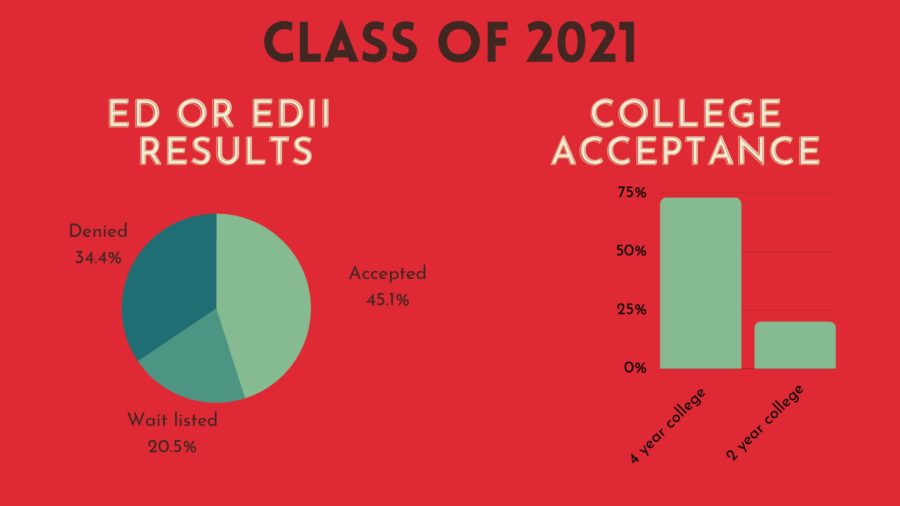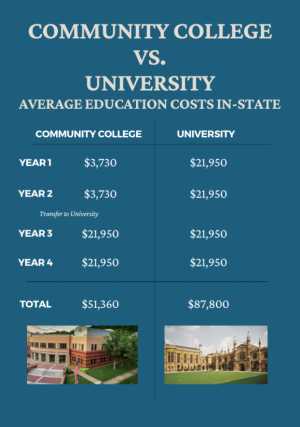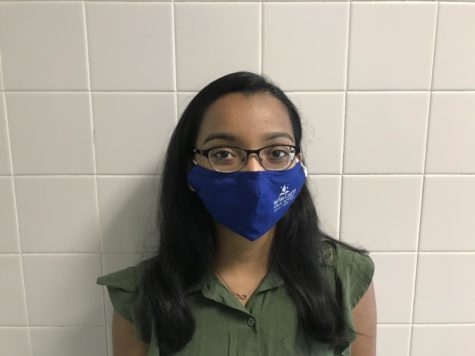Students apply early to college; look for payoff
College acceptance varies for Early Decision applicants.
December 16, 2021
Wednesday, Dec. 15 can mean something different to every senior. For many, it’s hump day—just another arbitrary Wednesday. For others, it’s two days away from winter break. But for about 25% of the senior class, Dec. 15 is early decision day. Of the several types of college admission plans, the early decision (ED) is binding, meaning students are required to attend the college.
Students have many reasons for applying ED, such as finishing the application process early and having to spend less money applying to college.
“I decided to apply ED to the University of Virginia mainly because I think that it’s a really good school,” senior Sanyam Shekhawat said. “It’s nearby and has a good business school. It’s kind of my dream school and applying ED gives me a higher chance of getting accepted since I’m indicating to the college that it is my top choice.”
Additionally, students don’t have to apply to as many schools if they apply ED and can spend less time working on applications overall. According to CollegeVine, the average student applies to eight to 12 schools and the application process can take up to 100 hours.
“By applying early decision, I don’t need to spend as much money or energy on more college applications,” senior Christina Jeong said.
US News reports that the average application fee is around $46. But for highly ranked state schools like Virginia Tech and UVA, the cost to apply is $60 and $75, respectively.
However, not everyone that applies ED is accepted. Out of the 125 seniors that applied ED or EDII (the second cycle of binding decisions offered by some schools) last year, 55 were accepted, 23 deferred, 2 waitlisted and the rest denied, according to the college and career center. Nationally, around 62.2% of ED applicants are accepted, according to US News.
“If I wasn’t accepted, I would be pretty disappointed since I spent time applying early,” Jeong said.
Although highly-selective institutions reject a majority of their deferred applicants, there still remain several options, such as exploring and applying to other colleges.
“Deferred means that you actually are competitive,” career center specialist Khristie Greiner said. “Colleges want to see your senior grades and then make a decision.”
Students who are deferred are recommended to continue making an effort to do well in their classes. Additionally, they should indicate to the college that they are still interested in attending by contacting the admissions office.
“I would strongly encourage students to write a love letter to the university and tell them how much you want to come to show that even with a deferral, [the college] has remained your number one choice,” Greiner said.
For students that get rejected, the most important thing to remember is that one rejection from one school does not equate to rejections from every other school they apply to. Students should analyze their applications and identify their strengths and weaknesses during the first application cycle.
The next step for both deferred and rejected applicants is to start applying to more colleges before the regular decision deadline, which for most Virginia state schools is Jan 1. Students should look at what programs and activities attracted them to their ED school, and apply to schools that offer similar opportunities. Additionally, reflecting on what went well and what can be improved during the application cycle
“My number one piece of advice is to take a deep breath and back away,” Greiner said. “Think about why you applied ED to a specific school, and research other schools that are similar because schools are more alike than they are different.”






